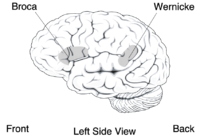
Photo from wikipedia
Primary Progressive Aphasia (PPA) is a neurological syndrome characterized by impaired language due to neurodegeneration. It is subdivided into three variants: semantic, agrammatic or nonfluent, and logopenic. Pieces of evidence… Click to show full abstract
Primary Progressive Aphasia (PPA) is a neurological syndrome characterized by impaired language due to neurodegeneration. It is subdivided into three variants: semantic, agrammatic or nonfluent, and logopenic. Pieces of evidence have suggested that learning disabilities in childhood, such as dyslexia, might be susceptibility factors in the occurrence of PPA in adulthood. The objective of this study was to verify the existence of the relationship between PPA and the history of learning disabilities of patients and their children, compared to a control group of individuals with Alzheimer's disease (AD). A questionnaire was applied to investigate the presence of indicators of learning disabilities and difficulties in individuals with PPA and AD and their children. Twenty subjects with PPA and 16 with AD participated in the study. Our findings are presented and discussed in light of the current scientific evidence and the social, educational, and economic Brazilian scenario. Despite the challenges of doing research with individuals with PPA in Brazil, we present the first evidence about the investigation of association between the history of learning disabilities and difficulties and PPA in native Brazilian Portuguese speakers.
Journal Title: Frontiers in Neurology
Year Published: 2022
Link to full text (if available)
Share on Social Media: Sign Up to like & get
recommendations!